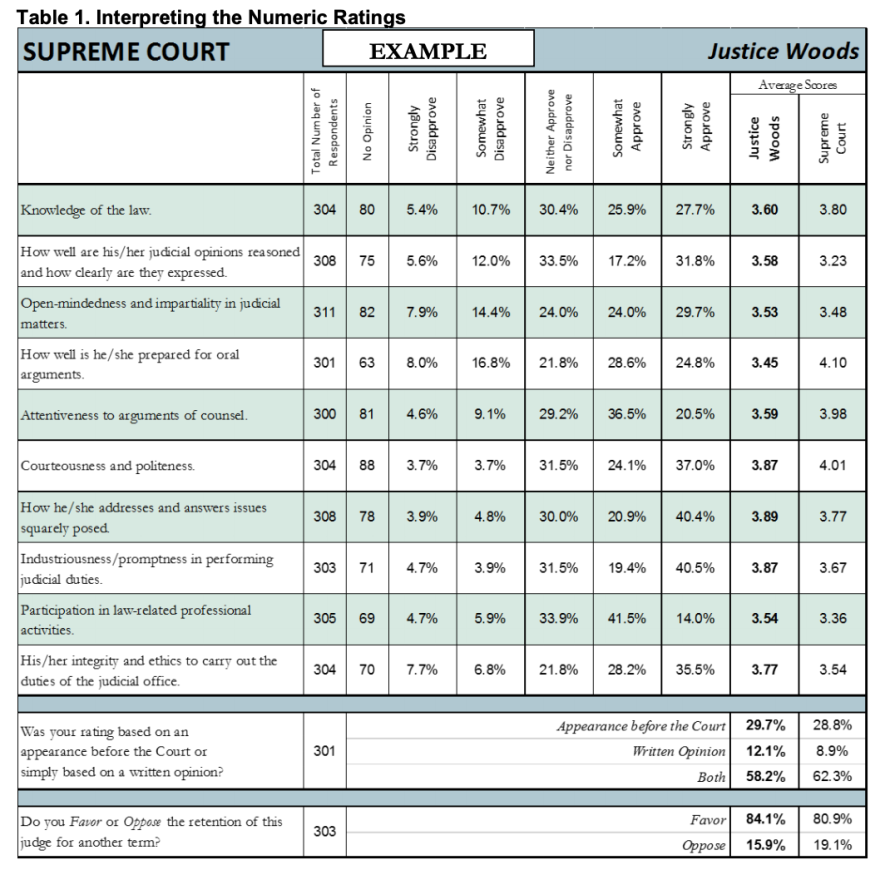As Wyoming residents prepare to vote in November's general election, there will be 28 judges across the state up for "retention." It's up to voters to decide if these judges get to keep their jobs. But how do you sort out who these people are? Wyoming Public Radio's Catherine Wheeler spoke with Executive Director of the Wyoming State Bar Sharon Wilkinson about how this process works.
Sharon Wilkinson: Wyoming doesn't have elections for its judges. We have judicial nominations. So, Article 5, Section 4(c) of the Wyoming Constitution establishes what's known as the Judicial Nominating Commission. And the Judicial Nominating Commission is made up of three lay members, not lawyers, that are selected by the governor. Then three members who are elected by the Wyoming State Bar members each year. So that's three lawyers. And then the chief justice of the Wyoming Supreme Court serves as the chair of the Judicial Nominating Commission. So how the process works in Wyoming is if there's a vacancy on the bench, interested candidates then submit what's called an expression of interest to the Judicial Nominating Commission. There's a lot that goes into when determining whether or not you want to express interest to serve as a judge. And then the judicial nominating commission members have to review all of that information on each person that expresses interest. And so, the judicial nominating commission then meets to determine who it would like to interview. And then after the interviews, they select the top three candidates, and then they submit the names to the governor. And then the governor has 30 days to make that decision. The governor makes the selection, but the public gets to weigh in on whether they should be retained or not.
Catherine Wheeler: As voters are considering this on their ballots, how are they supposed to find out information about these judges?
SW: There aren't a whole lot of resources, unfortunately. So, depending on the information that the public is looking for, there's information about the judges on the judicial branch website, but you know, not extensive information. And otherwise, the poll is really the only way to learn about their performance issues.
CW: The Wyoming state bar has a Judicial Advisory Poll. How does that work? What information is the bar providing to people? And basically, what is it?
SW: It gives a good overview about what attorneys, what they say on the judicial retention vote. So, you can see the percentages of attorneys who voted either in favor or in opposition of a certain judges retention. But it also gives you the individual snapshot on each judge with the numerical rating so that you could see how attorneys rated them in all those different areas. Everything from the knowledge of the law to... is the judge courteous and polite? And do his or her rulings come out in a timely manner? So, it just provides the numerical rating so that you can so as members of the public can see what the attorneys think of these judges' performance.
CW: And why do you think that's a helpful source to have for voters when considering retention?
SW: I think the majority of the public, they don't have much experience with the justice system. And so, I think this is just the next best thing is, let's hear from the people who are in front of these judges. Maybe not on a daily basis, but the poll asks attorneys to rate the judges whom they've been before within the last 24 months. So, for the last two years, these attorneys have been practicing in these courts and working directly with these judges. Otherwise, there really isn't much information available to the public about the judges.
CW: Are there any additional resources, you know, for people to find out more about the judges or their decisions?
SW: Another resource would be the Commission on Judicial Conduct and Ethics. That is a state entity that deals with all judicial complaints. And the Commission on Judicial Conduct and Ethics does put out an annual report. And so that would be an additional resource. But granted, they're only going to focus on the complaints that they've received and how many of them resulted in any type of disciplinary action. And as you can imagine, that's pretty minimal.
CW: Yeah, and I think a big question that people could have when they're considering all this is why is learning about our judges in the state, at every level, important? Like how do these people affect our regular lives?
SW: It's critically important because these judges are making important decisions that impact Wyoming citizens every single day. They're making decisions, deciding the outcome of civil disputes, contract disputes, even as basic as in the family courts, the disputes about custody divorces, things like that. They're just making decisions on very important rulings that impact, oftentimes, every citizen of Wyoming.
Have a question about this story? Contact the reporter, Catherine Wheeler at cwheel11@uwyo.edu.








